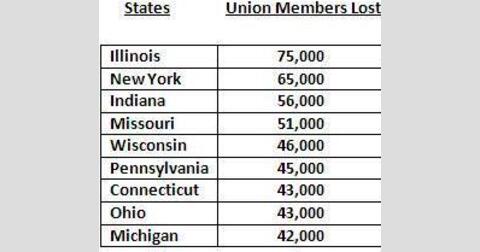Michigan Lost 42,000 Union Members Last Year
BLS report says state faced ninth largest drop in the country
The state of Michigan lost 42,000 union members from 2011 to 2012, the ninth largest drop in the country, according to a Jan. 23 report by the U.S. Bureau of Labor Statistics.
Illinois had the largest drop in the country with a loss of 75,000 union members.
Overall, the union membership rate in the U.S. dropped from 11.8 percent in 2011 to 11.3 percent in 2012. Since 1983 — the first year comparative data is available — union membership in the country had dropped from 17.7 million to 14.4 million, a 19 percent drop.
Michigan's union membership went from 671,000 in 2011 to 629,000 in 2012, a 6-percent drop. Michigan became a right-to-work state in the waning days of 2012 meaning unions can’t require an employee be fired for declining to pay union dues or agency fees.
"The fact that Michigan lost over 40,000 members last year shows that the old union model of doing business wasn’t working," said F. Vincent Vernuccio, director of labor policy at the Mackinac Center for Public Policy. "Our state needs the economic development and prosperity seen in the other right-to-work states. When our state succeeds so will the unions, in time right-to-work may even stop the atrophy organized labor has experienced in its own membership."
Antony Davies, an associate professor of economics at Duquesne University, said Michigan is part of a national trend that has seen a drop in union membership across the country.
"Oddly, this is a sign of union success," Davies said in an email. "Unions arose in response to monopsonist firms exploiting workers. With unions, workers could deal with these monopsonists on a more equal footing. Over time, free markets and competition have eroded monopsonist (and monopoly) power making unions largely unnecessary. In fact, where unions persist (mostly in the public sector), the power imbalance now tends in the opposite direction.
"Many unions now exert monopoly power, advancing the interests of their members at the expense of unemployed workers, non-union workers, and taxpayers. … The need for what unions do — balance power — is not outdated. But the free market and competition perform that role better than unions. That's why private sector workers have chosen to do away with unions."
However, University of Michigan Economist Don Grimes questioned whether the BLS data was accurate.
"The drop in membership while the auto industry and other manufacturing industries were growing seems unlikely," Grimes said in an email. "My guess is that you are looking at some inaccurate data. It could be that either the 2011 data was too high or the 2012 data is too low."
Michigan Capitol Confidential is the news source produced by the Mackinac Center for Public Policy. Michigan Capitol Confidential reports with a free-market news perspective.


 Steelworkers Union hit with unfair labor practice charges by Viking Corporation employee
Steelworkers Union hit with unfair labor practice charges by Viking Corporation employee
 Labor Day is a good time for Michiganders to remember their labor rights
Labor Day is a good time for Michiganders to remember their labor rights
 Michigan ranks 15th in job growth as national employment stalls
Michigan ranks 15th in job growth as national employment stalls